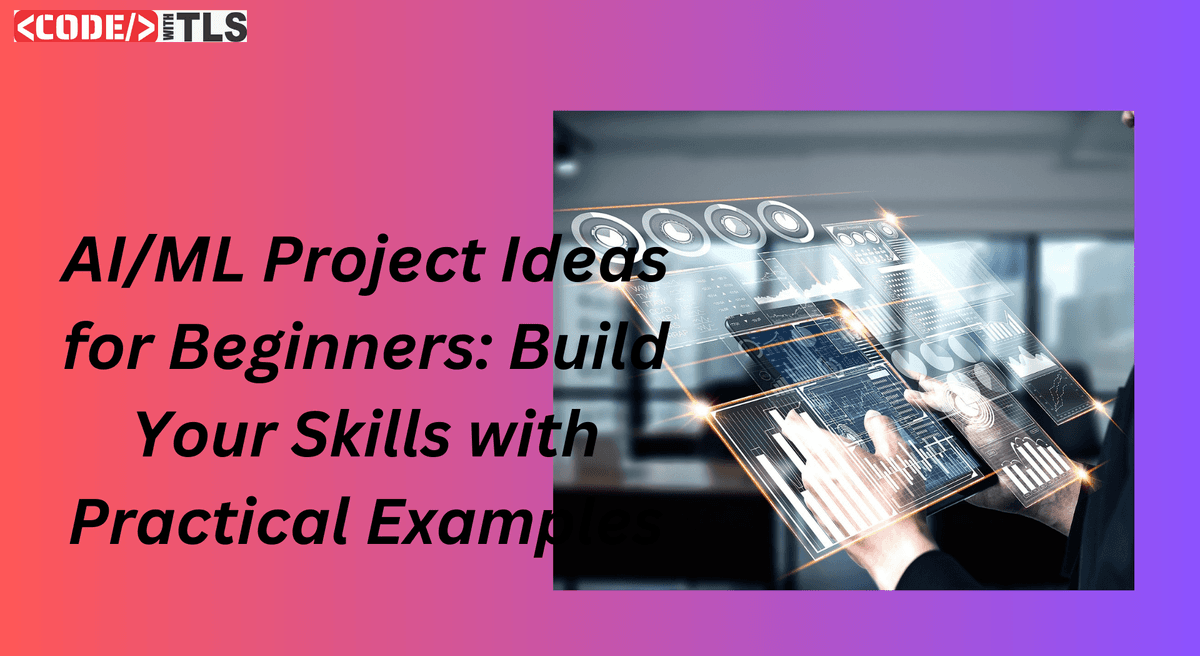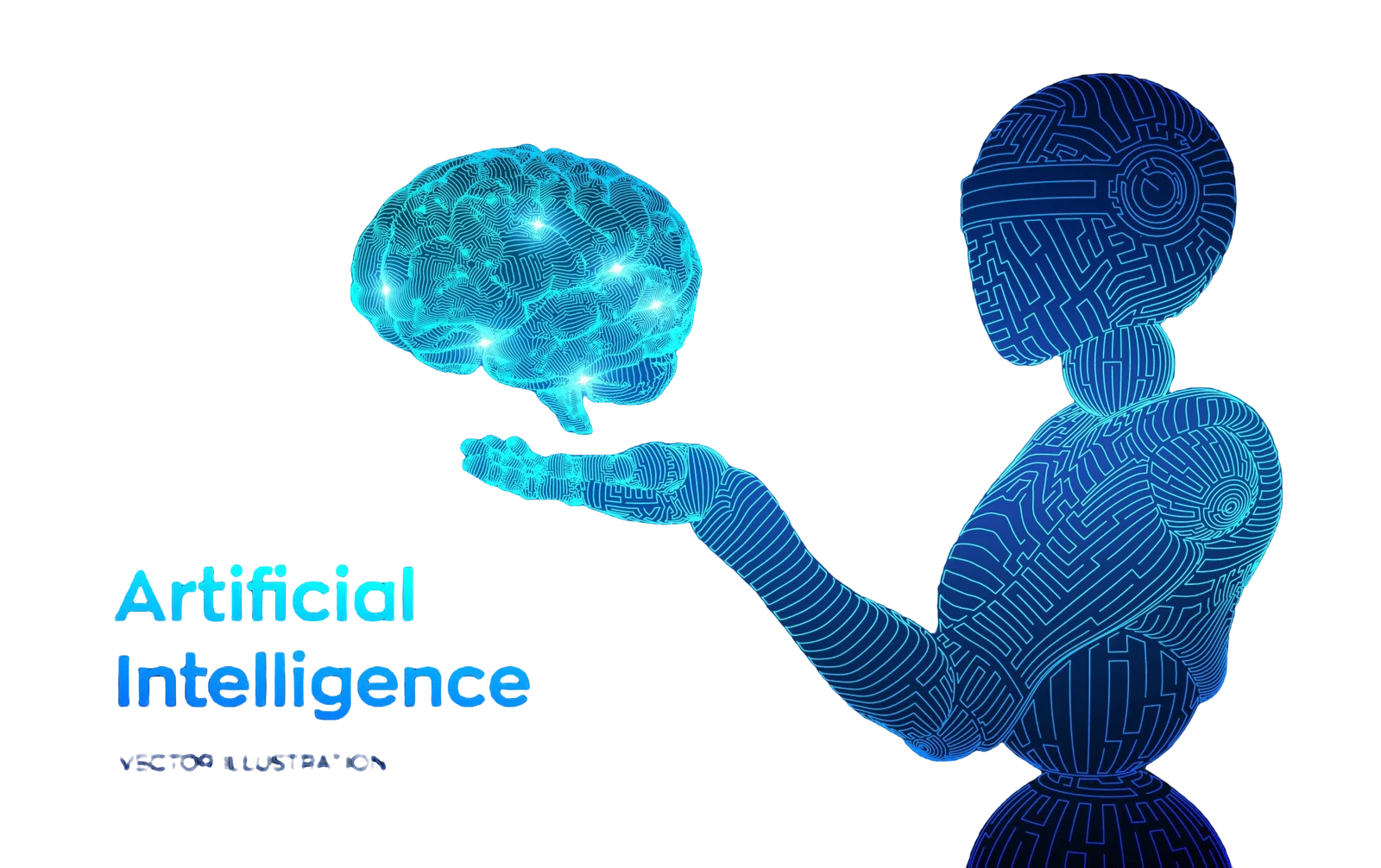

AI/ML Project Ideas for Beginners: Build Your Skills with Practical Examples
Published: 2025-01-09 11:46:13
Artificial Intelligence (AI) and Machine Learning (ML) are at the forefront of technological advancements today. As industries across the globe adopt AI/ML solutions to improve their operations, there has never been a better time for beginners to learn these technologies. With a multitude of online resources and tools available, anyone can start building AI/ML projects, regardless of their background.
AI/ML project ideas for beginners
In this article, we will explore various AI/ML project ideas for beginners that will help you get hands-on experience and build practical skills. Whether you're a student, professional, or hobbyist, these beginner-friendly projects will boost your confidence and help you understand how AI and ML algorithms work in real-life applications.
What Are AI and Machine Learning?
Before we dive into the project ideas, it's important to understand what AI and ML are and how they relate to each other.

- Artificial Intelligence (AI) is the broader concept of machines being able to carry out tasks that would typically require human intelligence. These tasks include decision-making, problem-solving, language understanding, and visual perception.
- Machine Learning (ML) is a subset of AI that focuses on algorithms and statistical models that allow computers to learn from data and improve over time without being explicitly programmed. In simpler terms, ML enables computers to recognize patterns and make decisions based on those patterns.
AI Tools for Digital Marketing 2025
Android App Development Certification Course
Become a Successful Business Intelligence Analyst
Why Should Beginners Focus on AI/ML Project Ideas?
While AI/ML concepts may seem daunting at first, hands-on experience is one of the most effective ways to learn. Working on AI/ML project ideas for beginners allows you to:
- Build a strong foundation: You’ll gain a deeper understanding of machine learning algorithms, data preprocessing, and model evaluation techniques.
- Apply theoretical knowledge: Implementing projects allows you to translate theoretical knowledge into practical applications.
- Enhance problem-solving skills: AI and ML projects require creative thinking and problem-solving, which are valuable skills in the tech industry.
- Create a portfolio: A strong portfolio of AI/ML projects can make you stand out to potential employers, showcasing your skills and initiative.
Now, let’s dive into some exciting AI/ML project ideas for beginners.
Know About: MERN Stack Certification Course: What You’ll Learn and Why It Matters
1. Spam Email Classifier
One of the most common applications of machine learning is text classification. In this project, you’ll build a spam email classifier that can differentiate between spam and non-spam emails based on their content.
Key Skills Learned:
- Natural Language Processing (NLP)
- Text classification algorithms like Naive Bayes, SVM, or Logistic Regression
- Data preprocessing (tokenization, stopword removal, etc.)
Steps:
- Collect a labeled dataset of emails (spam and non-spam).
- Preprocess the text data by removing stop words, and punctuation, and converting all text to lowercase.
- Use a text vectorizer like TF-IDF to convert the text data into numerical features.
- Train a classification model such as Naive Bayes or Logistic Regression.
- Evaluate the model’s performance using accuracy, precision, recall, and F1-score.
This project is a great introduction to NLP and classification tasks, making it one of the top AI/ML project ideas for beginners.
2. Handwritten Digit Recognition
Recognizing handwritten digits is a classic project for machine learning beginners. The MNIST dataset, which contains 28x28 grayscale images of handwritten digits, is commonly used for this task.
Key Skills Learned:
- Neural Networks
- Convolutional Neural Networks (CNNs)
- Image preprocessing
Steps:
- Load the MNIST dataset, which is available through popular libraries like Keras or TensorFlow.
- Preprocess the image data by normalizing the pixel values.
- Build a simple neural network or a more advanced CNN model for digit classification.
- Train the model and evaluate it on the test set.
- Fine-tune the model by experimenting with different architectures, learning rates, and activation functions.
This project will help you understand deep learning models and their application to computer vision, one of the most powerful areas in AI.
Benefits of Digital Marketing Course
Best Digital Marketing Course in India
Best Digital Marketing Institute in Delhi
Best Mobile App Development Course
Best Mobile App Development Course Certification
Best Programming Languages to Learn in 2025
3. Movie Recommendation System
Building a movie recommendation system is an exciting way to get started with collaborative filtering and content-based filtering techniques, which are foundational in machine learning.

Key Skills Learned:
- Data preprocessing
- Recommender systems (Collaborative Filtering, Content-Based Filtering)
- Matrix factorization
Steps:
- Use a publicly available dataset like the MovieLens dataset, which contains user ratings for movies.
- Preprocess the data to create a user-item matrix.
- Implement a collaborative filtering algorithm (e.g., k-nearest neighbors or matrix factorization).
- Generate movie recommendations for users based on their preferences and behaviors.
- Evaluate the model using metrics like Mean Squared Error (MSE) or Root Mean Squared Error (RMSE).
A recommendation system is a great way to dive into unsupervised learning and build an application that users will find practical.
4. Predicting House Prices
Predicting house prices is a popular regression problem that can be tackled using machine learning. In this project, you will predict the price of a house based on various factors such as square footage, location, number of rooms, etc.
Key Skills Learned:
- Regression algorithms (Linear Regression, Decision Trees)
- Data preprocessing and feature selection
- Evaluation metrics like RMSE and MAE
Steps:
- Use a dataset like the Boston Housing dataset or a Kaggle dataset that contains features of houses (e.g., area, number of bedrooms).
- Preprocess the data by handling missing values, scaling features, and encoding categorical variables.
- Train a regression model such as Linear Regression, Decision Tree, or Random Forest.
- Evaluate the model using performance metrics like RMSE, Mean Absolute Error (MAE), and R-squared.
- Optimize the model by experimenting with different algorithms and feature engineering techniques.
This project will teach you the basics of regression and model evaluation, both essential in ML applications.
5. AI Chatbot
An AI-powered chatbot is a versatile project idea that can be used in various domains such as customer service, education, or healthcare. By using NLP techniques, you can create a bot that can answer simple queries.
Key Skills Learned:
- NLP (text processing, intent classification)
- Deep learning (RNNs, LSTMs)
- Chatbot frameworks (Dialogflow, Rasa)
Steps:
- Define the scope of your chatbot (e.g., a customer service chatbot or a weather query bot).
- Collect or create a dataset of potential user queries and responses.
- Preprocess the text and convert it into suitable formats for training.
- Train a classification model to predict the intent behind a user’s query.
- Build a simple user interface (UI) where users can interact with the chatbot.
This project will give you hands-on experience with NLP, deep learning, and conversational AI, making it one of the most interesting AI/ML project ideas for beginners.
6. Customer Segmentation Using Clustering
Customer segmentation is an essential task in marketing, where businesses group customers based on common characteristics. This project will introduce you to clustering algorithms like K-Means or DBSCAN.
Key Skills Learned:
- Unsupervised learning
- Clustering algorithms (K-Means, DBSCAN)
- Dimensionality reduction techniques (PCA)
Steps:
- Use a customer dataset (e.g., demographic data, purchase history).
- Preprocess the data by handling missing values and scaling features.
- Apply clustering algorithms like K-Means to group customers based on their characteristics.
- Evaluate the quality of the clusters and visualize them using tools like PCA (Principal Component Analysis).
- Analyze the clusters to derive actionable insights for marketing strategies.
Clustering projects are ideal for beginners who want to explore unsupervised learning techniques.
7. Sentiment Analysis on Social Media Posts
Sentiment analysis is a form of NLP that involves classifying the sentiment of a text (positive, negative, or neutral). You can build a sentiment analysis model for social media posts such as tweets or Facebook status updates.
Key Skills Learned:
- Sentiment analysis
- Text preprocessing and tokenization
- Model evaluation (accuracy, precision, recall)
Steps:
- Collect a dataset of social media posts (e.g., using Twitter’s API).
- Preprocess the text data (tokenize, remove stopwords, and convert to lowercase).
- Use machine learning models like Naive Bayes or SVM for classification.
- Train the model on labeled data (positive, negative, neutral sentiments).
- Evaluate the model using performance metrics and visualize the results.
This project will help you understand how AI can be used to analyze human emotions and sentiments, a key area of application for AI in social media.
Read More: Top Data Science Jobs in India: An In-Depth Look at Career Opportunities
Top AI & ML Project Ideas for Beginners: Projects for Novices
Artificial Intelligence (AI) and Machine Learning (ML) are revolutionizing many industries, and getting hands-on experience with these technologies is essential for beginners. Here are some top AI/ML project ideas for beginners that will help novices gain practical skills and build a solid foundation.

- Image Classification with CNNs: Use Convolutional Neural Networks (CNNs) to classify images from datasets like CIFAR-10. This project introduces computer vision and deep learning basics.
- Stock Price Prediction: Implement Linear Regression to predict future stock prices using historical data. This project teaches regression techniques and time series forecasting.
- Iris Flower Classification: Use the popular Iris dataset to classify flowers into different species. This simple classification project is great for beginners learning algorithms like Logistic Regression and Decision Trees.
- Sentiment Analysis: Create a model to predict the sentiment of text, such as tweets or product reviews. This involves Natural Language Processing (NLP) techniques and classification algorithms like Naive Bayes.
- Weather Prediction: Build a weather prediction model using historical data. Apply regression techniques like Random Forest to forecast temperature or rainfall.
- Fake News Detection: Train a classifier to distinguish between real and fake news articles using text classification. This project is a good introduction to NLP and supervised learning.
- Tic-Tac-Toe Game AI: Develop a game-playing AI for Tic-Tac-Toe using the Minimax algorithm. This project focuses on decision-making and algorithms.
- Recommendation System: Build a movie or product recommendation system based on user preferences using collaborative filtering techniques. This is a practical application of unsupervised learning.
These AI/ML project ideas for beginners will provide hands-on experience with core machine learning concepts and algorithms, helping you gain skills that are essential for tackling more complex problems.
Big Data Analytics in Data Science
Can I Learn Coding After 10th?
Career Opportunities and Salaries for MERN Stack Developers
Data Science Course Duration and Fees 2025
FAQs
1. What is the best AI/ML project for beginners?
Great beginner projects include a Spam Email Classifier, Handwritten Digit Recognition, or a Movie Recommendation System. These projects cover key AI/ML concepts like text classification and recommendation systems.
2. Do I need programming knowledge to start AI/ML projects?
Basic Python knowledge is helpful, but many AI/ML libraries are beginner-friendly and come with tutorials to guide you.
3. How do AI/ML projects help my career?
These projects build your problem-solving skills and create a portfolio that showcases your ability to solve real-world problems, making you more attractive to employers.
4. What tools should beginners use for AI/ML projects?
Start with Scikit-learn for machine learning, TensorFlow/Keras for deep learning, and Pandas for data manipulation. These tools are beginner-friendly and well-documented.
5. How long does it take to complete a beginner AI/ML project?
Basic projects take a few days to a few weeks, depending on complexity and your experience level.
Summary
The AI/ML project ideas for beginners presented in this article are designed to help you get hands-on experience with a range of machine learning techniques, from supervised learning to unsupervised learning and natural language processing. Working on these projects will enable you to understand the practical aspects of AI and ML, providing you with a strong foundation for more advanced projects in the future.
Remember that the key to mastering AI and ML is consistent practice. These projects will not only help you learn but also allow you to create a portfolio of work that can impress future employers or clients. By solving real-world problems with AI and ML, you'll gain confidence and take significant steps toward becoming an expert in the field.
Also Read: Python for Data Science: Why It’s Essential and How You’ll Use It


